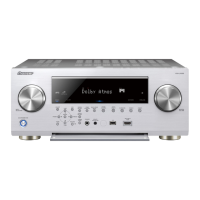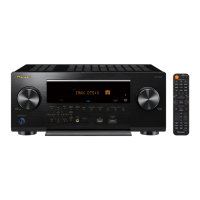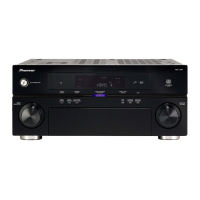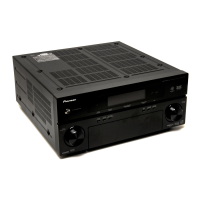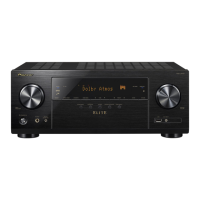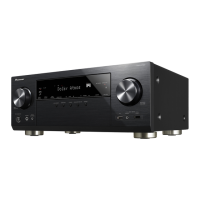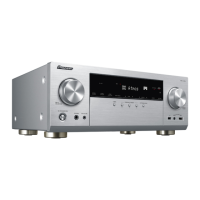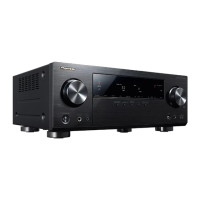Do you have a question about the Pioneer VSX-LX50 and is the answer not in the manual?
Overview of key features like Advanced Direct Energy design, MCACC, THX, and digital audio decoding.
Ensures all components like setup microphone and remote are present.
Instructions on proper placement and environmental considerations for the receiver.
Guidance on safely inserting batteries into the remote control unit.
Details on the remote's capability to control multiple components and its LCD interface.
Explains the concept of surround sound and its components.
Basic steps for connecting and setting up the system for surround sound.
Step-by-step process for automatically calibrating speakers and room acoustics.
Addresses potential issues like room noise or microphone connection problems.
Basic instructions for selecting and playing audio or video sources.
Explains how phase correction enhances sound reproduction and clarity.
Identifies and describes all input and output terminals on the receiver's rear panel.
Details on connecting HDMI, Component, Composite, and S-Video sources.
Guides for connecting digital (Coaxial, Optical) and analog audio sources.
Comprehensive guide to installing, connecting, and placing speakers for optimal sound.
Instructions for connecting AM and FM antennas for radio reception.
Final steps for connecting the receiver to a power outlet after all connections are made.
Identifies and explains the functions of buttons and dials on the receiver's front panel.
Details on the optimal distance and angle for remote control functionality.
Explanation of various indicators and symbols shown on the receiver's display.
Description of the remote control's buttons and their functions for various components.
Automatic source detection and selection of playback modes for ease of use.
Guide to selecting various standard surround sound modes for stereo and multichannel sources.
Explanation of THX certified modes for cinema, music, and gaming experiences.
Details on using various modes for enhanced surround sound experiences.
Covers basic stereo playback and Front Stage Surround Advance features.
Instructions for using direct modes for purest audio reproduction, bypassing processing.
Guide to connecting USB mass storage devices for audio playback.
Explanation of remote control buttons for navigating and controlling USB playback.
How to browse and select audio files from the USB device's folder/file list.
Information on supported audio file formats, bit rates, and codecs for USB playback.
Instructions for tuning FM and AM radio using automatic and manual methods.
How to tune to a specific radio station by entering its frequency directly.
Procedure for storing favorite radio stations for quick recall.
Customizing names for stored radio stations for easier identification.
Explains Radio Data System features and how to search for programs by type.
How to use Enhanced Other Network information for traffic and news broadcasts.
Introduction to accessing and navigating the System Setup menu for configuration.
Guide to initial automated speaker and room calibration for surround sound.
Setting options for using surround back speakers or alternative configurations.
Detailed fine-tuning of speaker levels, distance, EQ, and standing wave control.
Managing MCACC presets: checking, copying, renaming, and clearing.
Configuring speaker size, levels, distance, X-Curve, and THX settings manually.
Instructions for connecting and playing music from an iPod via the receiver.
Details on connecting HDMI-equipped components for high-quality audio/video transfer.
How to connect DVD players with 5.1/7.1 analog outputs for surround sound.
Instructions for setting up and using a second pair of speakers for stereo playback.
Techniques to improve speaker performance by using separate or dual wiring.
Guide to adding external amplifiers to enhance system power output.
Connecting to a Pioneer plasma display for enhanced control and features.
Assigning input sources to terminals and renaming input functions for user convenience.
Customizing SR+ features for Pioneer plasma displays and adjusting OSD position.
Covers setting AV options and making audio/video recordings.
Covers signal level, sleep timer, display dimming, impedance, settings check, and reset.
Procedures for returning the receiver to factory settings or checking defaults.
Setting up the remote to control other components via preset codes or learning.
Customizing the display names for input sources on the remote control.
Using Direct Function, Multi Operation, and System Off for integrated control.
Details on controlling TVs and other components using the receiver's remote.
Connecting Pioneer components using SR CONTROL jacks for integrated operation.
Solutions for common problems related to power, sound, video, display, and connectivity.
Descriptions of Dolby, DTS, WMA, and THX audio technologies and formats.
Tables outlining listening modes based on input signal formats and SBch processing.
Technical details on power output, sensitivity, and distortion for amplifier performance.
Details on input/output levels, frequency response, and tone controls for the audio section.
Technical data for FM reception including sensitivity, signal-to-noise ratio, and selectivity.
Technical data for AM reception including frequency range and selectivity.
Details on power requirements, consumption, dimensions, and weight.
List of items provided with the receiver, such as microphone, remote, and antennas.
Guidance on how to safely clean the receiver's exterior surfaces.


